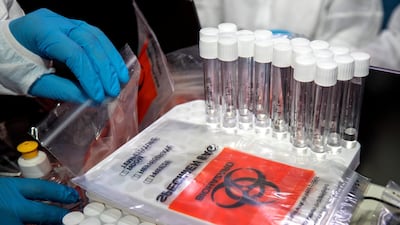Stay-home orders imposed across the country to stem the spread of Covid-19 have now been lifted.
Officials revealed late on Wednesday night that restrictions on movement during night-time hours had been eased following the completion of a three-month national sterilisation programme.
It means residents - who were told to previously to remain indoors after 11pm in Dubai and 10pm in the rest of the country - can now venture outside once more.
Infection rates across the Emirates are continuing to decline, and the UAE is slowly inching back to normality.
Most businesses have now reopened, with cinemas in both Ras Al Khaimah and Sharjah being the latest to welcome patrons again this week.
And more restrictions were relaxed across the UAE in recent days.
However, many safety measures designed to prevent a second wave of infections remain – and could be in place for some time.
But what are they?
The National explains.
Restrictions that apply nationwide
Face masks remain mandatory in the vast majority of cases.
Dubai has relaxed its rules surrounding masks slightly, with exceptions made for those alone, exercising, or people who have an illness that makes it difficult to breathe with a mask on.
The only other exception to rules on masks across the country is if someone is travelling in a car on their own.
There are numerous fines in place to govern the use of masks, including penalties for both employees and companies if people fail to wear them while at work.
No more than three people are allowed to travel together in a car, unless they are all members of the same family.
Social distancing of 2m should also be maintained at all times in public places, unless they are members of the same household.
Events, parties and gatherings are banned, and anyone found hosting or attending one will be fined.
"We stress that public gatherings are still prohibited, and avoidance of family visits is preferable to ensure the health and safety of all, commitment to social spacing, wearing masks and gloves when leaving the house," said Saif Al Dhaheri, spokesperson for the National Emergency, Crisis and Disaster Management Authority, UAE on Wednesday night.
Across the country, mosques and other places of worship also remain shut, as do nurseries, schools and universities.
Domestic workers are not supposed to meet anyone outside the household. The rule applies in all emirates except Dubai.
Children are now allowed to visit restaurants and malls, but those aged older than 70 are still barred from entering them in Abu Dhabi, Sharjah, Ajman, Umm Al Quwain, Ras Al Khaimah, and Fujairah. In Dubai, there are no longer any age restrictions.
Abu Dhabi
A ban has been in place on people entering the emirate since June 2.
Initially announced for seven days, but subsequently extended until June 23, residents of Abu Dhabi city, Al Ain and Al Dhafra can travel within their cities but not elsewhere in the emirate without first obtaining a permit.
Anyone wishing to leave is now free to do so, but a permit is required to re-enter the emirate. Employees working in vital sectors, chronic disease patients visiting hospitals, and those transporting goods are exempted.
Authorities have not yet allowed pools in residential buildings and compounds in Abu Dhabi to reopen.
Public beaches and cinemas also remain shut, as do nurseries, schools and universities.
Dubai
Many entertainment areas and now open again, but soft play areas and children’s “edutainment” centres including Kidzania and Oli Oli are still shut.
The Northern Emirates
Beaches remain closed in Umm Al Quwain until further notice.
Elsewhere, in Ras Al Khaimah, smoking, campfire and barbecues are prohibited on beaches and gatherings of more than five people are banned.
























